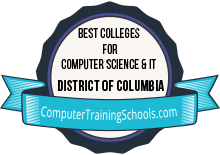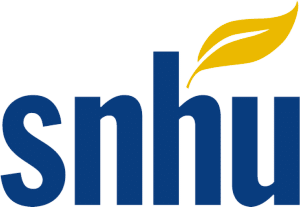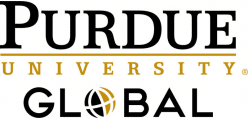There are a number of reasons tech-related organizations are calling the District of Columbia their home. First and foremost, it’s close to Fortune 500 companies, national nonprofits, as well as the federal government — all if which use technology to operate. Washington D.C. is also full of many co-working spaces and incubators that support tech entrepreneurs.
Students attending computer sciences schools in the District of Columbia can certainly benefit from D.C.’s thriving technology sector. After graduation, they are likely to start or continue with jobs that are relevant to their tech studies and skills.
District of Columbia’s Technology Initiatives
Several initiatives have been created to promote technology access and technology businesses in Washington D.C. Here’s a brief look at a few of them.
- Incentivizing high-technology businesses: Qualified High Tech Companies (QHTC) rewards companies that lease or own an office in D.C. and derive at least 51 percent of their gross revenues from certain high-tech activities such as data processing and software development. These companies can enjoy tax exemptions, tax credits, and other money-saving benefits that can help them hire more graduates of IT schools in D.C.
- Fostering the development of tech businesses: To encourage tech businesses in D.C., the Creative and Open Space Modernization Grant was created. It provides technology-focused businesses with the potential to earn up to $5 million to improve their facilities and create great places to work for students enrolled in computer science schools.
- Providing technical support to D.C. residents: The All Hands Tech initiative, founded by Connect.DC and OCTOHelps, aims to provide D.C. residents with the technology support and education they need at no cost. D.C. residents can count on All Hands Tech any time they have a tech-related question or issue such as a laptop with a virus or a problem with their smartphone.
Southern New Hampshire University
- Some of the nation’s most affordable tuition rates, from a private, nonprofit, NEASC accredited university
- Qualified students with 2.5 GPA and up may receive up to $20K in grants & scholarships
- Multiple term start dates throughout the year. 24/7 online classroom access
- Offering over 200 online degree programs
Purdue University Global
- Experience world-class education online with more than 175 programs at associate’s, bachelor’s, master’s and doctoral levels.
- Apply eligible work experience and prior college credits toward up to 75% of your undergraduate degree.
- You have the option of trying out a Purdue Global undergraduate program for an introductory 3-week period. There’s no cost beyond the application fee.
- Competency-based ExcelTrack™ programs may allow you to earn your degree faster and for less money
Best Colleges for Computer Science and IT in the District of Columbia

To ensure a successful technology industry in D.C. going forward, having an educated workforce is key. Prospective students who are interested in computer science or information technology-related careers can choose from various public and private institutions to earn their degree. Students in Washington, D.C., can pursue their education through campus-based or online computer science programs. Here’s a list of the best IT schools in the District of Columbia.
| Ranking | School Name | In State Avg. Undergrad Tuition | % Receiving Financial Aid | Retention Rate |
|---|---|---|---|---|
| 1 | George Washington University | $52,889 | 81% | 93% |
| 2 | Catholic University of America | $45,040 | 98% | 87% |
| 3 | Georgetown University | $53,520 | 53% | 96% |
| 4 | American University | $47,640 | 76% | 88% |
| 5 | University of the District of Columbia | $5,028 | 85% | 60% |
| 6 | Gallaudet University | $16,512 | 96% | 72% |
| 7 | Strayer University-District of Columbia | $13,185 | % | Unknown |
Spotlight on Computer Sciences Schools in District of Columbia
Computer sciences schools in the District of Columbia can prepare students for careers in computer science or information technology. Here’s a few examples of schools with interesting program offerings.
- Georgetown University: Georgetown’s bachelor’s program in computer science comes with flexible requirements and can benefits students who would like to pair computer science with math, biology, linguistics, government, or another field of study.
- Gallaudet University: Students at Gallaudet can pursue a Bachelor of Science in Information Technology and help develop apps at the school’s Center of Visual Language and Visual Learning. The program also gives them the opportunity to complete a software development project.
- George Washington University: GWU offers computer science degree programs that allow students to focus on digital media, bioinformatics, computer security and information assurance, biomedical computing, and medical preparation.
- Howard University: A program that culminates in a Bachelor of Business Administration in Computer Information Systems is available at Howard University. It integrates business with computing and consists of courses like database management and information systems consulting.
IT Salaries and Career Outlook in the District of Columbia
A few of the fastest-growing occupations in the District of Columbia’s technology sector include computer systems analysts, computer user support specialists, and software developers.
D.C. area startups like Equiday, a SaaS solution for finance managers at school districts and Yombu, a fintech company that serves member-based businesses like gyms and quick service organizations like coffee shops may hire these types of IT professionals.
Computer systems analysts, computer user support specialists, and software developers may also find employment in the public sector as well as at larger companies in D.C. like Alarm.com, which provides security and smart home automation and Appian, an application development platform.
| Career | Annual Median Wage |
|---|
2019 Occupational Employment Statistics and 2018-28 Employment Projections, Bureau of Labor Statistics, BLS.gov.
Computer Science Scholarships for District of Columbia Students
Although computer science programs in the District of Columbia can be expensive, there are scholarships that can help make them more affordable. Here are a few examples of program-specific scholarships.
- AFCEA Washington, D.C. Chapter Scholarship: This award is for eligible graduating high school seniors within local area who plan to major in computer science, cybersecurity, management information systems, or a related field.
- Bison STEM Scholar: This award program through Howard University is for students who are committed to ultimately pursuing a Ph.D. in a STEM field, including computer science. The award covers tuition and fees.
- CyberCorps Scholarship for Service Program at Georgetown University: Funded by a grant from the National Science Foundation, this award is open to undergraduate and graduate students in fields such as computer science and technology. Recipients can receive tuition and stipend support as well as professional development opportunities. After earning a degree, graduates are expected to work in cybersecurity in the public sector.
District of Columbia Professional Organizations and Resources
IT professionals and students enrolled in IT degree programs in the District of Columbia may find several professional organizations and resources valuable. Several of these organizations and resources include the following.
- DCFemTech: This collective supports women are interested in pursuing careers in technology. The organization hosts special events and networking opportunities and offers special grants and awards.
- Association for Computing Machinery: The Washington D.C. chapter of ACM offers educational opportunities and events for coders and students interested in coding careers.
- Code for DC: This meet-up group, a chapter of the Code for America Brigades, for together coders and partners with nonprofit organizations to help solve issues in the industry.
Sources
- 20 Amazing Tech Companies Hiring in Washington, DC, Indeed.com, Accessed August 2019, https://www.indeed.com/prime/resources/talent/20-amazing-tech-companies-hiring-in-washington-dc
- Association for Computing Machinery-Washington D.C. Chapter, Accessed December 2019, https://dcacm.org/
- Bachelor of Arts in Computer Science, Georgetown University, Accessed December 2019, https://cs.georgetown.edu/newba/#_ga=2.220398874.384530060.1566783651-2027772003.1566783651
- Bachelor of Science in Information Technology, Gallaudet University, Accessed August 2019, https://www.gallaudet.edu/department-of-science-technology-and-math/information-technology
- Chapter Scholarships, AFCEA Washington DC, Accessed December 2019, https://dc.afceachapters.org/?q=content/chapter-scholarships
- Code for DC, Accessed December 2019, https://www.meetup.com/Code-for-DC/
- Computer Information Systems, Howard University, Accessed December 2019, https://bschool.howard.edu/majors/computer-information-systems/
- Computer Science, The George Washington University, Accessed December 2019, https://programs.gwu.edu/undergraduate/computer-science?searched=y
- Connect.DC – Digital Inclusion Initiative, DC.gov, Accessed December 2019, https://connect.dc.gov/free-tech-support
- DCFemTech, Accessed December 2019, http://dcfemtech.com
- Georgetown Offers New Cybersecurity Scholarship, Accessed December 2019, https://provost.georgetown.edu/news-story/georgetown-offers-new-cybersecurity-scholarship/#
- Qualified High Tech Companies (QHTC), DC.gov, Accessed December 2019, https://dmped.dc.gov/node/1123181
- Washington, DC: A Top Tech Hub in the US, Washington D.C. Economic Partnership, Accessed August 2019, https://wdcep.com/dc-industries/tech/
To be included in the rankings, all colleges had to meet the following criteria:
- Be an accredited U.S. institution
- Offer either 2 or 4-year degree programs
- Be active in the 2016-17 school year
- Offer a degree in a technology-related subject
- Have awarded at least one degree in that subject in 2015-16
- Have reported data for all ranking variables listed below
Ranking variables:
- Related subjects, based on the number of relevant programs that are offered at any level
- Flexibility, based on number of relevant programs that are offered at any level via distance education
- Average in-state undergraduate tuition
- Percent of undergraduate students awarded federal, state, local, institutional or other sources of grant aid
- Average amount of federal, state, local, institutional, or other sources of grant aid awarded to undergraduate students
- Graduation rate
- Retention rate
Methodology Sources:
- Integrated Postsecondary Education Data System (IPEDS) 2016-17, National Center for Education Statistics, http://nces.ed.gov/ipeds/



